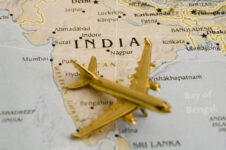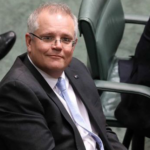Fortress Australia Now Includes the Turning Back of Citizens as Illegal Flight Entries

Nations globally have closed borders with India due to the intensity of the second wave of COVID-19 sweeping the country.
However, Australia stands alone in the extreme ban it’s implemented, as not only has it blocked entry to noncitizens, but it’s further barred return to citizens and residents currently in India and criminalised them if they attempt re-entry.
In operation from 3 to 15 May, the India travel ban has left around 9,500 Australians stranded in a disaster zone, at a time when every Hollywood celebrity seems to have been given the greenlight to take refuge in Australia whilst avoiding the extreme virus situation in the US.
The charge of racism has been levelled against the government, which is easy to posit, as when the pandemic peaked in the US and the UK, the per capita infection rate was higher than in the South Asian country, yet no similar border restrictions, or accompanying criminal offences, applied.
Critics have further pointed out that in imposing this ban, the Morrison government is simply extending its tough border policies that usually relate to asylum seekers coming from the East.
The only difference now being its classifying its own citizens as “illegal entries”, as well as noncitizens.
Criminalising returning
On 30 April, health minister Greg Hunt imposed the Biosecurity (Human Biosecurity Emergency) (Human Coronavirus with Pandemic Potential) (Emergency Requirements—High Risk Country Travel Pause) Determination 2021 (Cth), which makes arriving in Australia within 14 days of leaving India a crime.
Aimed at Australian citizens and permanent residents attempting to re-enter Australia via a third country, the determination invokes the penalty contained in section 479 of the Biosecurity Act 2015 (Cth), which carries a maximum of 5 years imprisonment and/or a fine of $63,000.
And many have further criticised the health minister for having announced this drastic and unprecedented measure via a press release sent out at midnight on 30 April.
“Blood on his hands”
In a rare occurrence, the Morrison government has united both sides of the political divide in opposition to its ban, as those from all persuasions have spoken out against the revoking of the right of return for citizens being a step too far.
The PM appeared on Nine’s Today program on 4 May to explain that it was “absurd” to suggest he has “blood on his hands” in relation to the ban. And he asserted that it would be “highly unlikely” that anyone would be charged under the temporary laws if they were to breach them.
Morrison raised the border closure with China in early 2020 as another instance where his government had been forced to take tough measures during the pandemic that led to widespread condemnation.
However, the China ban didn’t apply to citizens or residents, and neither did it involve criminal offences.
The deluge of criticism has not been restricted to the Greens and Labor, as numerous Coalition MPs and even the likes of conservative commentator Andrew Bolt have condemned the ban.
And by last Friday, the prime minister had announced there would be no extension of the ban, as repatriation flights would commence on 15 May.
The authoritarian creep
Morrison’s retraction – and blatant denial – of his initial tough on borders rhetoric, following the backlash against the India ban are a little too late.
The PM has now set a precedent that under his governance citizens can potentially be criminalised for returning home, especially if they’re non-European. Although, this is hardly surprising considering his background in border politics.
As immigration minister in 2013, Morrison oversaw the implementation of Operation Sovereign Borders. These days, he has a boat shaped trophy on a desk in his office, celebrating the turning away of desperate people seeking help.
And in 2014, he drafted laws that have led to the mass deportation of Kiwi residents.
Indeed, placing such restrictions upon citizens returning from India, when no such bans were put in place in relation to nations of the Anglosphere struggling with the virus, erodes what it means to be a citizen of this country, as well as the protections the status of citizenship is supposed to entail.
The India ban also indicates to the general public, especially those of non-Anglo background, that some citizens are more Australian than others. And the restriction further leaves the local Indian community open for targeting at home as a result of this special treatment.
So, in this instance, the PM has displayed that the legislative framework the Coalition has been constructing since it took office in 2013 has developed to such an extent that not only does Fortress Australia keep out noncitizens, but it can also extend to citizens the government deems worthy.







